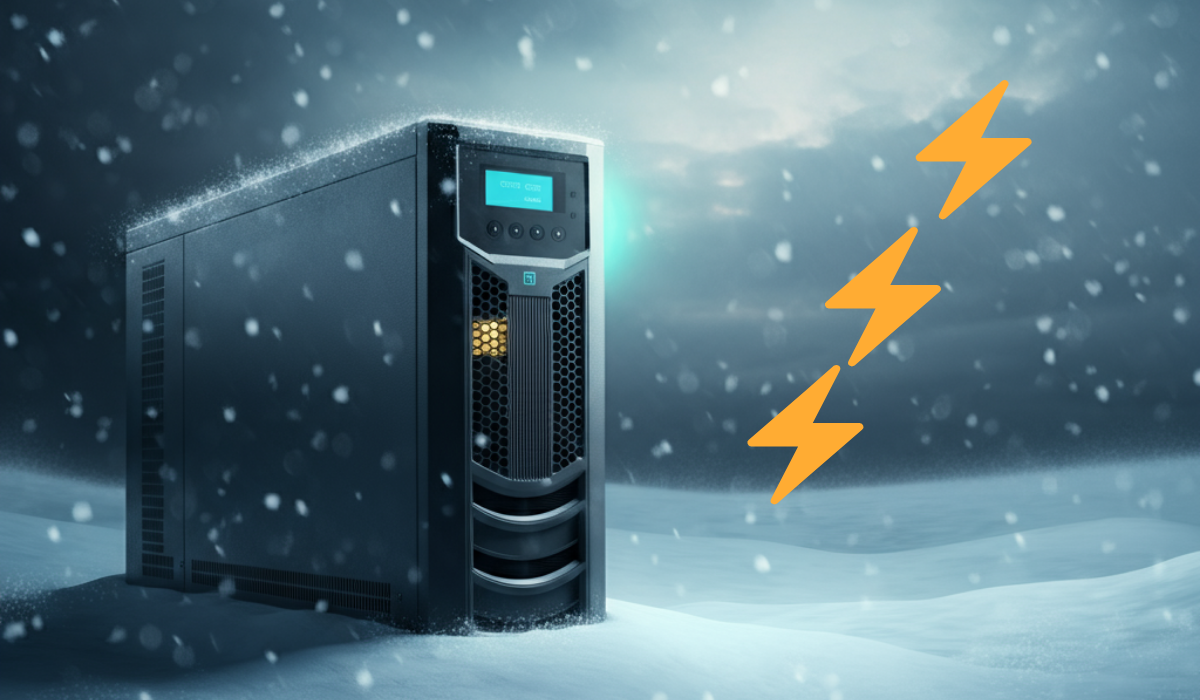There’s nothing worse than losing power in the middle of a snowstorm—especially when you’re in a snowbreak-prone area. Imagine you’re cozied up, the heater’s humming, or you’re running mission-critical systems for work, and suddenly, blackout. It’s not just an inconvenience; for some, it can be downright life-threatening. That’s where an uninterruptible power supply (UPS) comes in to save the day (or night).
A UPS isn’t just a fancy gadget; it’s a lifeline. It ensures you have backup power when it matters most. Whether you’re managing a small home office, a medical facility, or even a logistics hub in a snow-prone area, a UPS can keep your essential systems running. Let’s explore why these systems are so crucial, how to pick the right one for snowbreak-prone locations, and real-life stories about how a UPS has become a game-changer in icy conditions.
Why Is a UPS a Must-Have in Snowbreak Locations?
How Do Snowbreaks Impact Power Supply?
Ah, snowbreaks—the double-edged sword of winter beauty. Sure, snow blankets can look magical, but for power lines, it’s another story. Heavy snow and ice can weigh down powerlines, snapping them like twigs. Factor in strong winds, snow drifts, and fallen trees, and you’re looking at extended outages.
For areas prone to snowbreaks, power loss is all but inevitable. And power flickering on and off isn’t just a minor nuisance; those surges can also damage sensitive equipment like computers, servers, and medical devices. Not great, right?
Critical Systems That Can’t Afford to Go Dark
Here are some places where power backup is non-negotiable:
- Healthcare Facilities
Imagine a hospital losing power during a blizzard. Life-support machines, ventilators, or even basic lighting could shut down. Lives are literally at stake.
- Data Centers
Servers crashing because of an outage? That can mean lost data, frustrated customers, and hours of recovery.
- Home Offices
Think about work-from-home setups. A sudden outage can mean missed meetings or lost work progress, not to mention a complete loss of heating or communication.
- Logistic Hubs and Grocery Stores
Cold storage going down? Say goodbye to perishables.
This is why having a UPS as part of your winter prep is a no-brainer.
How to Choose the Right UPS for Snowbreak Locations
Alright, so now you’re sold on getting a UPS. But where do you even start? Not all UPS systems are made equal, especially when you’re dealing with sub-zero winters.
Key Factors to Consider
- Capacity (VA Rating):
First thing’s first—how much power do you actually need? Match the UPS’s capacity to your devices’ combined load. Running a server farm? You’ll need something beefier than what’s used for a single PC.
- Battery Type:
Look for systems that use lithium-ion batteries over lead-acid ones. They perform better in cold weather and tend to last longer.
- Environmental Tolerance:
Check the temperature ranges the UPS can handle. Devices designed for extreme weather conditions are a must for snow-prone zones.
- Runtime Duration:
How long should the UPS provide power? Enough time to shut down systems safely? Or do you need hours of extended support?
- Scalability:
If your needs may grow—think an expanding business or adding new devices—ensure your UPS can scale along with you.
Types of UPS for Snowy Conditions
- Standby UPS: Basic, good for home setups.
- Line-Interactive UPS: These can handle voltage fluctuations better (perfect for harsh conditions).
- Online/Double-Conversion UPS: Continuous supply, ideal for critical applications like medical labs or data centers.
Real-Life Case Study
Take Jim’s Data Hub in Upstate New York. Last winter, their servers faced constant outages with every heavy snowfall. After installing an online UPS with a 2-hour runtime, they not only eliminated downtime but also improved their client satisfaction rates by 25%.
Installing and Maintaining a UPS in Snowbreak Areas
Where to Place Your UPS?
Placement matters, folks! Keep the UPS indoors, in a well-ventilated and temperature-controlled room. Avoid damp basements or places where snowmelt might make its way inside.
Maintenance Tips
- Regular Testing: Don’t wait for an actual outage before testing your UPS. Do a runtime test every couple of months.
- Inspect Batteries: Frosty weather can be tough on batteries, even lithium-ion ones. Keep an eye on wear and tear.
- Keep Firmware Updated: Yes, UPS systems often come with software that needs routine updates for optimal working.
Proper maintenance ensures your UPS will work when you actually need it—not just when it feels like cooperating.
Real-World Stories That Prove the Value
When a Healthcare Facility Stayed Online
Linda, an admin at a rural clinic, recalls how a snowstorm wiped out the town’s power for over 10 hours. Luckily, their UPS kept their medical refrigerators and emergency equipment running until the backup generators were ready. Patients—and a whole lot of vaccines—were saved.
Small Business Testimonial
“Our UPS saved our holiday season” – Emma runs a small bakery in Vermont. When snow shut everything down for two days, her commercial fridge and payment system kept running thanks to a reliable UPS setup.
These examples prove that a solid UPS system is less of an expense and more of an investment when you’re navigating winter power challenges.
Frequently Asked Questions About UPS in Snowbreak Conditions
How long will my UPS last in extreme cold weather?
This depends on the UPS type and battery quality. High-end models designed for snowy conditions are built to withstand freezing temperatures, but routine maintenance will ensure they last longer.
Can I use a generator instead of a UPS?
Generators are great for prolonged outages but are not instantaneous like UPS systems. A UPS bridges the gap between the power going out and the generator kicking in, ensuring zero downtime.
What happens if I overload my UPS?
Overloading your UPS can cause it to fail unexpectedly, leaving you without power. Always calculate your equipment’s requirements and choose a UPS that comfortably supports your load.
Are UPS systems noisy?
Most high-quality UPS setups are relatively silent, with occasional fan noises during heavy usage. Some even have noise-free modes.
Time to Power Up
Living or working in snowbreak-prone areas means power preparation isn’t optional—it’s essential. Whether you’re managing a medical facility, running a bakery, or simply want to keep lights on at home, a UPS ensures that life (and business) goes on, even when the snow is piling up outside.
Don’t wait until the next blizzard to discover you’re unprepared. Evaluate your needs, research the right UPS for your situation, and make sure you’re ready when nature flips the off switch.
Got questions or need guidance? Feel free to reach out for expert advice on choosing, purchasing, and installing the perfect UPS.

